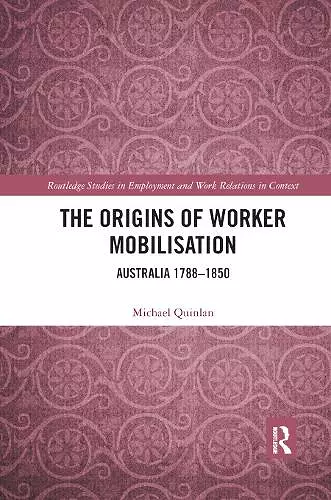The Origins of Worker Mobilisation
Australia 1788-1850
Format:Paperback
Publisher:Taylor & Francis Ltd
Published:5th Dec '19
Currently unavailable, and unfortunately no date known when it will be back
This paperback is available in another edition too:
- Hardback£145.00(9781138084087)

This is a book on how and why workers come together. Almost coincident with its inception, worker organisation is a central and enduring element of capitalism. In the 19th and 20th centuries’ mobilisation by workers played a substantial role in reshaping critical elements of these societies in Europe, North America, Australasia and elsewhere including the introduction of minimum labour standards (living wage rates, maximum hours etc), workplace safety and compensation laws and the rise of welfare state more generally.
Notwithstanding setbacks in recent decades, worker organisation represents a pivotal countervailing force to moderate the excesses of capitalism and is likely to become even more influential as the social consequences of rising global inequality become more manifest. Indeed, instability and periodic shifts in the respective influence of capital and labour are endemic to capitalism.
As formal institutions have declined in some countries or unions outlawed and severely repressed in others, there has been growing recognition of informal strike activity by workers and wider alliances between unions and community organisations in others. While such developments are seen as new they aren’t. Indeed, understanding of worker organisation is often ahistorical and even those understandings informed by historical research are, this book will argue, in need of revision.
This book provides a new perspective on and new insights into how and why workers organise, and what shapes this organisation. The Origins of Worker Mobilisation will be key reading for scholars, academics and policy makers the fields of industrial relations, HRM, labour economics, labour history and related disciplines.
"This is a truly path-breaking study of the collective impulse among workers, with important pointers for the global historiography of labour."
Terry Irving, University of Wollongong, Australia
"Quinlan sees much in common with today’s world of work and the period he examines. He writes with the radical certainty that those who are oppressed can only redress their grievances by making those who rule uneasy, with even the smallest actions contributing to this unease. All of which, collectively and eventually, makes a difference. Overall, Quinlan’s book is testament to the possibilities and persistence of dissent and rebellion despite draconian and oppressive hegemonies that would have it otherwise – yesterday, today, and tomorrow."
Rowan Cahill, Labour History Melbourne
In its own terms, Quinlan’s book is a major achievement, not least because it has the
capacity to propel the history of class structures here and overseas in new directions.
Moreover, it is timely, as he points out, to consider this history in a period when precarious
labour and informal methods of struggle return, as the global working class’ reality,
in the neo-liberal era.
Terry Irving, University of Wollongong, Australia
"Its major contribution will remain the depth of its inquiry into a period when unfree and free labour underpinned economic growth, in often extremely harsh working conditions, but tempered by the challenges that workers, individually and collectively, threw up to them"
Mark Finnane Griffith University
This is a remarkable, and remarkably useful, book. It is the outcome of an exhaustive project – over 30 years of excavating the history of workers’ struggles, exactly the kind of work that the neoliberal university has no time for. From those decades of systematic and comprehensive trawling through the colonial press and an eno
ISBN: 9780367890469
Dimensions: unknown
Weight: 453g
308 pages